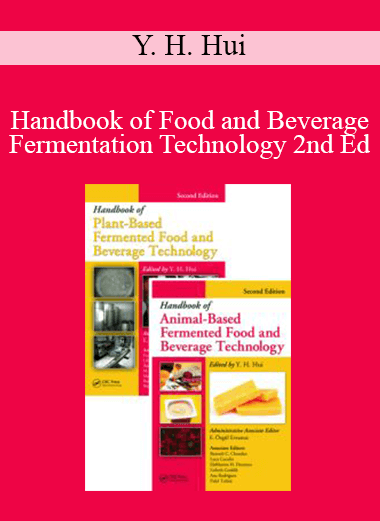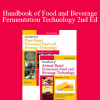Y. H. Hui – Handbook of Food and Beverage Fermentation Technology 2nd Ed
$280.00 Original price was: $280.00.$70.00Current price is: $70.00.
Digital Download: You will receive a download link via your order email after successful payment.
Format: [Ebook – 1 PDF] | 12.85 MB
Fermented food can be produced with inexpensive ingredients and simple techniques and makes a significant contribution to the human diet, especially in rural households and village communities worldwide. Progress in the biological and microbiological sciences involved in the manufacture of these foods has led to commercialization and heightened interest among scientists and food processors. Handbook of Fermented Food and Beverage Technology, Second Edition is an up-to-date two-volume set exploring the history, microorganisms, quality assurance, and manufacture of fermented food products derived from both plant and animal sources.
Each book in the set begins by describing fermented product manufacturing before delving into more specialized topics.
Handbook of Plant-Based Fermented Food and Beverage Technology explores:
- Soy beverages and sauce, soymilk, and tofu
- Fruits and fruit products, including wine, capers, apple cider and juice, mangos, olive fruit, and noni fruits
- Vegetables and vegetable products, including red beet juice, eggplant, olives, pickles, sauerkraut, and jalapeño peppers
- Cereals and cereal products, including fermented bread, sourdough bread, rice noodles, boza, Chinese steamed buns, whiskey, and beer
- Specialty products such as balsamic vinegar, palm wine, cachaça, brick tea, shalgam, coconut milk and oil, coffee, and probiotic nondairy beverages
- Ingredients such as proteolytic bacteria, enzymes, and probiotics
Handbook of Animal-Based Fermented Food and Beverage Technology discusses:
- Dairy starter cultures, microorganisms, leuconostoc and its use in dairy technology, and the production of biopreservatives
- Exopolysaccharides and fermentation ecosystems
- Fermented milk, koumiss, laban, yogurt, and sour cream
- Meat products, including ham, salami, sausages, and Turkish pastirma
- Malaysian and Indonesian fermented fish products
- Probiotics and fermented products, including the technological aspects and benefits of cheese as a probiotic carrier
Fermented food products play a critical role in cultural identity, local economy, and gastronomical delight. With contributions from over 60 experts from more than 20 countries, this work is an essential reference distilling the most critical information on this food sector.
Get Download Y. H. Hui – Handbook of Food and Beverage Fermentation Technology 2nd Ed at IMC.sale today!
Delivery Method
– After your purchase, you’ll see a View your orders link which goes to the Downloads page. Here, you can download all the files associated with your order.
– Downloads are available once your payment is confirmed, we’ll also send you a download notification email separate from any transaction notification emails you receive from IMC.sale.
– Since it is a digital copy, our suggestion is to download and save it to your hard drive. In case the link is broken for any reason, please contact us and we will resend the new download link.
– If you cannot find the download link, please don’t worry about that. We will update and notify you as soon as possible at 8:00 AM – 8:00 PM (UTC+8).
Thank You For Shopping With Us!





6 reviews for Y. H. Hui – Handbook of Food and Beverage Fermentation Technology 2nd Ed
There are no reviews yet.